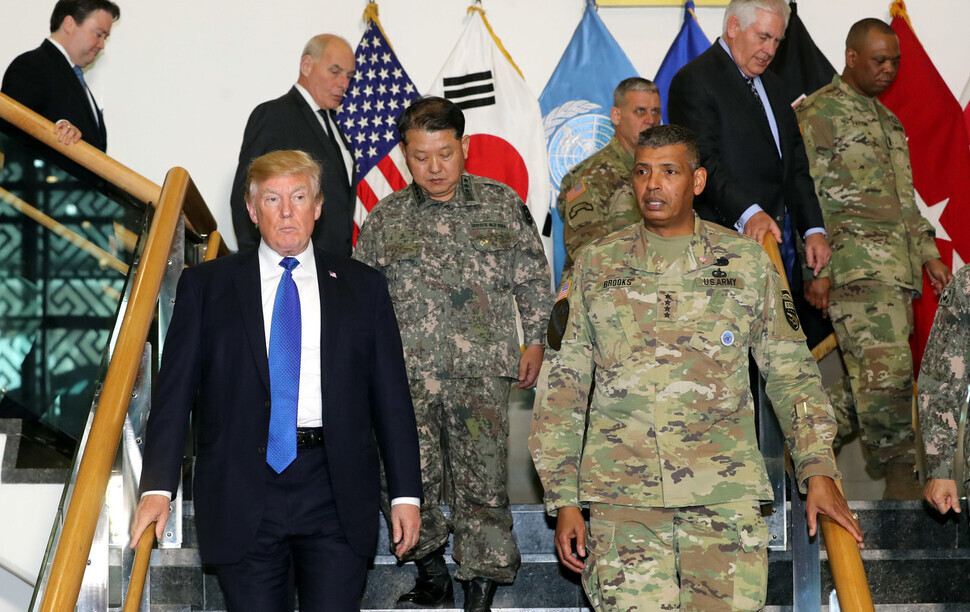hankyoreh
Links to other country sites 다른 나라 사이트 링크
US military and security officials call for exerting pressure on N. Korea

There are growing calls from former American military and security officials for the US to exert military pressure in response to actions by North Korea that have elevated tensions on the Korean Peninsula.
One such figure is Vincent Brooks, former commander of US Forces Korea (USFK), who took part in a video seminar hosted on June 17 by the Center for Strategic and International Studies (CSIS), an American think tank. Brooks said that, were he the current USFK commander, “We would be seeking ways to increase pressure with the military instrument.”
Brooks suggested ending the embargo on deploying strategic assets to the Korean Peninsula, an embargo that has been in place since the spring of 2018. “We’re talking about nuclear-capable bombers, F-35 Joint Strike Fighters, aircraft carriers, nuclear submarines, all these things that are options to simply show presence,” the former USFK commander said.
“I would submit to you by bringing these back in, it would agitate North Korea. And North Korea, I believe, needs to be agitated right now as a result of this, so that they feel that they may have overstepped.”
Brooks added that such steps should be accompanied by diplomatic means, calling for the recovery of momentum for diplomatic engagement either between South and North Korea or between North Korea and the US.
H. R. McMaster, former White House National Security Advisor, said that the US needs to demonstrate militarily that it has the ability to respond effectively to North Korea’s threat. During a seminar organized by the Hudson Institute, McMaster argued that Ulchi-Freedom Guardian, a joint military exercise scheduled for August, should be held in a robust manner.
When asked about how the US would respond to North Korea in a video conference organized by the Association of Former Members of Congress, Congressman Ted Yoho said that the US would probably have to resume its military efforts and campaign with South Korea. Yoho is the Republican Party’s ranking member on the House Foreign Affairs Subcommittee on Asia, the Pacific, and Nonproliferation.
Democratic senators and members of congress are promoting legislation that would strengthen the US’ alliance with South Korea. On Wednesday, Senator Edward Markey and Congressman Ami Bera announced that they would be introducing the We Go Together Act, inspired by the “katchi kapshida” (“go together”) motto of the ROK-US alliance. Markey is the ranking member on the Senate Foreign Relations Subcommittee on East Asia, the Pacific, and International Cybersecurity Policy, and Bera is the chair of the House Foreign Affairs Subcommittee on Asia, the Pacific, and Nonproliferation. Their bill, if enacted, would require a US president seeking to change policy affecting the US’ mutual defense treaty with South Korea to provide Congress with specific reasons for that policy change at least 120 days before it takes effect.
By Hwang Joon-bum, Washington correspondent
Please direct comments or questions to [english@hani.co.kr]

Editorial・opinion
![[Column] Season 2 of special prosecutor probe may be coming to Korea soon [Column] Season 2 of special prosecutor probe may be coming to Korea soon](https://flexible.img.hani.co.kr/flexible/normal/500/300/imgdb/original/2024/0426/3317141030699447.jpg) [Column] Season 2 of special prosecutor probe may be coming to Korea soon
[Column] Season 2 of special prosecutor probe may be coming to Korea soon![[Column] Park Geun-hye déjà vu in Yoon Suk-yeol [Column] Park Geun-hye déjà vu in Yoon Suk-yeol](https://flexible.img.hani.co.kr/flexible/normal/500/300/imgdb/original/2024/0424/651713945113788.jpg) [Column] Park Geun-hye déjà vu in Yoon Suk-yeol
[Column] Park Geun-hye déjà vu in Yoon Suk-yeol- [Editorial] New weight of N. Korea’s nuclear threats makes dialogue all the more urgent
- [Guest essay] The real reason Korea’s new right wants to dub Rhee a founding father
- [Column] ‘Choson’: Is it time we start referring to N. Korea in its own terms?
- [Editorial] Japan’s rewriting of history with Korea has gone too far
- [Column] The president’s questionable capacity for dialogue
- [Column] Are chaebol firms just pizza pies for families to divvy up as they please?
- [Column] Has Korea, too, crossed the Rubicon on China?
- [Correspondent’s column] In Japan’s alliance with US, echoes of its past alliances with UK
Most viewed articles
- 1‘We must say no’: Seoul defense chief on Korean, USFK involvement in hypothetical Taiwan crisis
- 2AI is catching up with humans at a ‘shocking’ rate
- 3Division commander ordered troops to enter raging flood waters before Marine died, survivor says
- 4Is Japan about to snatch control of Line messenger from Korea’s Naver?
- 5The dream K-drama boyfriend stealing hearts and screens in Japan
- 6Korea protests Japanese PM’s offering at war-linked Yasukuni Shrine
- 7[Column] Season 2 of special prosecutor probe may be coming to Korea soon
- 8‘Weddingflation’ breaks the bank for Korean couples-to-be
- 9“Korea is so screwed!”: The statistic making foreign scholars’ heads spin
- 10[Column] ‘Choson’: Is it time we start referring to N. Korea in its own terms?